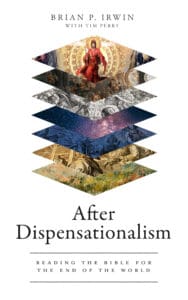
Christians’ fixation on the end times is not new. While eschatological speculation has sometimes resulted in distraction or despair, Scripture does speak about the end. In After Dispensationalism, Brian P. Irwin and Tim Perry reexamine the key texts and show how prophecy is primarily God’s word of hope for his people.
In the following interview, the two authors talk about their goals in writing the book, helping us understand what God wants his people to know about the end times.
Lexahm Press: Brian, what inspired you to write After Dispensationalism?
Brian P. Irwin: I grew up in a dispensationalist church and when I was a teenager my favourite Bible study was on the book of Revelation. The Late Great Planet Earth had been out for a few years and I devoured it and one of the sequels. It was all very exciting. I remember trying to relate Lindsey’s insights to my very patient high school history teacher saying, “But sir, the locusts—they’re helicopters!”
As I started to read Revelation on its own, however, I wasn’t so sure that the locusts were helicopters. Revelation didn’t seem so exciting anymore, but now I didn’t know what to do with it, so I put it aside—even if I continued to have the dispensationalist end-times storyline in my mind.
At seminary, I encountered people who hadn’t grown up with the dispensational approach that I had. They would sometimes complain about someone in their church who was always going on about Russia, the antichrist, or the tribulation and how frustrating that was. Asking how they understood Revelation, the answer was always some admission that they had no idea and planned to avoid it and Daniel altogether. In each case, my thought was, “If you don’t have anything better to offer, then don’t trash-talk someone who’s at least trying to understand these books.”
When I became a seminary professor, I decided to write a book that would speak to people like me and my friends—one that would respectfully explain dispensationalism and dispensationalists and point toward a better way of reading the biblical books related to end times.
LP: Tim, what motivated you to join Brian in writing this book?
Tim Perry: When Brian invited me to help him get this book across the finish line, I jumped at the chance because the subject matter reflected so much of my own ecclesial and personal formation. My church community was, historically, amillennial— or even postmillennial—in its eschatology, and quite optimistic about the eventual success of Global missions. This vision led to the establishment of thriving missions in Egypt, China (pre-revolution), Mexico, and Ghana. Apart from China, all of these continue to thrive; the Egyptian mission is now a church, entirely indigenous.
This outlook changed organically in the early 1970’s to a pretribulation premillennial eschatology which, while still stressing missions, was much more circumspect about the power of the Gospel to change lives. We went (literally!) from singing “We’ve a Story to Tell to the Nations” to “You’ve Been Left Behind.” The shift, as far as I can tell was down to the publication of The Late Great Planet Earth by Hal Lindsey and C.C. Carlson on the one hand, and the popularization of that eschatology among younger believers through the music of the Jesus Movement.
Brian’s invitation allowed me to think more critically about this change in my church and my own eschatological development from an inchoate dispensationalism to a more biblically grounded classical Augustinianism.
LP: Please explain the book and its structure.
Irwin: In three sections, the book seeks to explain dispensationalism and its end times story and point to a better way of understanding the biblical books that the system uses.
The first section starts with an overview of end-times speculation from first-century on. The rest of the section is sort of a field guide for people unfamiliar with dispensationalism— what is a dispensationalist and how do they differ from some of the fanatical doomsday cult figures that have emerged over the years? We then cover some of the significant figures in the movement from Darby to Tim LaHaye and their contributions to dispensationalism and its dissemination. From there we lay out the story that dispensationalism tells of our future and where it derives this from scripture. This first section ends with an overview of the main beliefs of dispensationalism today and what kind of behaviour in the church and world that one might expect to see as people live out those beliefs. The hope for this section is that it would help those for whom dispensationalism was the “water around the fish” and who now aren’t so sure how it arrives at the end times story it tells. It’s also for non-dispensationalists who might have a caricature in mind when thinking about dispensationalists.
The next section of the book, “The World of Prophecy and Apocalyptic” deals with what we see to be the key interpretative misstep that most dispensationalists make with regard to end times: the failure to distinguish between prophecy and apocalyptic. In particular, it is the tendency to see prophecy as a genre of prediction about the distant future and the failure to recognize apocalyptic as a distinct genre that conveys a message of hope to people undergoing a current crisis. The result of the former is a failure to see how the prophets used hyperbolic language to predict restoration in the post-exilic era with the result that descriptions of the post-exilic era are mistakenly taken to be descriptions of the millennium. Here we go through a number of prophetic passages to show how the prophets used highly figurative language to apply standard covenant curses from Leviticus and Deuteronomy to God’s errant people.
The final section of the book, “The Meaning of Biblical Apocalyptic” is where we dig into the three biblical books—Ezekiel, Daniel, and Revelation—that are the main source for dispensationalist teaching on the end of the world. Here, we look at the setting of the audience that first received the book along with how the book is understood with dispensationalism. Most of our attention here is taken up with an inductive look at the shape and meaning of each book followed by some takeaways about what these books might mean for the church today.
LP: Is your argument fundamentally anti-dispensationalist?
Irwin: What you won’t find anywhere in the book is a comprehensive takedown of dispensationalist ideas like the rapture. That approach would get us too quickly into the weeds and only serve to alienate a large swath of readers who might benefit from reading the book. More fruitful was to describe and address the broader interpretative issues and focus on reading the final form of scripture because this is what matters most.
Throughout, I tried to keep in mind that on end times and many other issues where I have changed my mind, I have done so through a long process of rumination and not through an epiphany. People don’t adopt your perspective simply because you have stated something. Knowing this is why we chose to avoid the condescending tone that characterizes many of the critiques of dispensationalism. As I wrote the book, the audience I had in mind was my mother, a gracious woman who was an earnest student and teacher of scripture and who was measured in her criticism. I was pleased to see that those who endorsed the book recognized this as the tone of the book.
LP: What contribution do you hope to make with your book?
Perry: I have three hopes. I hope it helps dispensationalists see that the critical questions that other Christians, who equally revere the Scriptures with them, raise are valid and worthy of reflective answers. I also hope it helps non-dispensationalists understand the movement from the inside. Finally, I hope it invites all readers to be more careful readers of Scripture.
LP: Share a few things about yourself that only your friends would know.
Irwin: I once tricked Tom Hanks into coming up and talking to me.
Perry: I own an autographed first edition vinyl of Welcome to Paradise by Randy Stonehill and am an amateur historian of the Jesus Movement and lover of first-generation Jesus Music.







